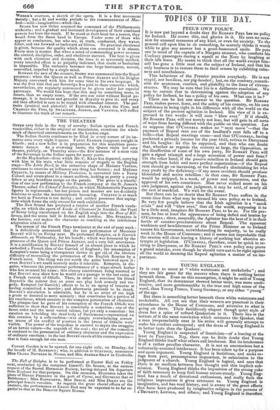THE THEATRES
OFFER very little in the way of novelty : Italian operas and French vaudevilles, either in the original or translations, constitute the whole stock of theatrical entertainments on the London stage.
The Italian theatre continues to be filled in every corner of its im- mense area every night it opens. FANNY ELSSLER reappears tonight in Giselle ; and a new ballet is in preparation for this matchless panto- mimic dancer. As a crowning lustre, the Queen visits her own theatre, publicly, on Thursday next—the first instance of a state visit of the Sovereign to the Italian opera for many years. At the Haymarket—from which Mr. C. KEAN has departed, carrying with him in his train what little remains of tragedy to the English stage—The Little Devil, in the attractive shape of Madame VESTRIS, continues to exercise an influence any thing but Satanic ; and Madame CELESTE, by means of Military Promotion, is converted into a Young Colonel, and struts about in a smart uniform, looking as pretty a young fellow as any beardless ensign on the parade. The piece is a transla- tion of one now performing by the French company at the St. James's Theatre, called Un Colonel d'Autrefois, in which Mademoiselle PROSPER figures in regimentals ; but her person and manner are too decidedly feminine to make the metamorphosis becoming. CELESTE is as much too hard as PROSPER is too dainty ; and neither possesses that espieg- lerie which forms the only excuse for such exhibitions. The New Strand has produced a version of another French vaude- ville, on which the opera of Linda di Chamouni:is founded ; the Pearl of Savoy being transformed on the English stage into the Rose of Kil- larney, and the scene laid in Ireland and London. Mrs. STIRLING is the heroine, and makes the character as touching as the infelicitous adaptation admits of. The season of the French Plays terminates at the end of next week : it is definitively announced that the last performance of Monsieur BourFi will be on Friday next. He performed Kempten, GU le Garrick Allemande, on Wednesday, for his benefit ; which was honoured by the presence of the Queen and Prince ALBERT, and a very full attendance. It is a modification by BOUFFE himself of an absurd piece in which he embodied a French idea of the Garrick of England ; the assumption of Kempten's name being a transparent device to get rid of the obvious difficulty of reconciling the personation of the English Roscius by a French actor. The thing was not worth the pains bestowed upon it : even BourFE's art could scarcely make it tolerable. Kempten, in dis- guise, witnesses the preposterous performance of a stage-struck barber who has assumed his name ; this clumsy contrivance being resorted to that BOUFFE may show how he would act a passage in the last scene of a French version of Othello. Then, in order to convince his friend Reynolds the painter that an actor can play both comedy and tra- gedy, Kempten (or Garrick) affects to be in an agony of remorse at having committed a murder ; and afterwards pretends to be drunk. BOUFFE'S simulation is admirable, but he is an artist of too high a grade to descend to mere mimicry : that constitutes but a portion of his excellence, which consists in the complete personation of character. The glimpse that he gave of his conception of the French Othello was sufficient to show that BourFn is essentially a comedian ; one of the finest order and the most varied talents, but yet only a comedian : his emotion on beholding the dead body of Desdemona—represented on this occasion by a sofa-cushion—was simply overwhelming sorrow no traces of the conflict of passions in the breast of Othello were' visible. The power of the tragedian is exerted to depict the struggles of an heroic nature—the anguish of the soul ; the art of the comedian is confined to the personation of ordinary character and the expression of ordinary emotions : in the last Bourvi excels all his contemporaries— that is fame enough for one man.


























 Previous page
Previous page